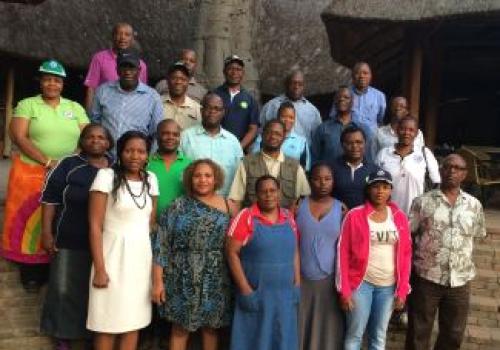Staff in Food, Agriculture and Natural Resources (FANR) Directorate recently took time off their busy schedules and took a week long retreat at Mowana Safari Lodge in Kasane, Botswana to review the implementation of the 2014-15 Business Plan for April-September 2014 and develop priorities and work plan for the remaining period October 2014 to March 2015.Staff also used the retreat to develop the 2015-16 Business Plan and improve the FANR section of the Draft Revised Regional Indicative Strategic Development Plan (RISDP) in line with the thrust on Industrialization. Further, staff identified strategies which could be synergised with other Directorates.
However, the retreat was not without the social need for staff to build teamwork and foster good working relationships across the board within the Directorate.Present at the retreat were staff from Environment and Sustainable Development, Food Security, Natural Resources Management and SADC Seed Centre programmes as well as Climate Change, Regional Vulnerability Assessment and Analysis (RVAA) and Regional Agricultural Policy (RAP) projects.
Environment and Sustainable Development programme highlighted its achievements as being improved sharing of environment information on environmental conditions and trends in the SADC Region, improved capacity for environmental management in the region and coordinated regional positions in the negotiations and implementation of multi-lateral environmental agreements (MEAs) and other agreements.
Other achievements included integration of environmental and sustainable development issues into sectoral, national and sub-national socio- economic planning and harmonized policy environment, as well as legal and regulatory frameworks to promote regional cooperation on all issues relating to environment and natural resources management including trans-boundary ecosystems.
The Food Security programme through RVAA outlined its achievements as being facilitation of the establishment processes of Vulnerability Assessment Committees (VACs) with 13 Member States having national VACs out of 15 SADC countries and facilitating the institutionalization and development of VAC Strategic Plans in Member States with Zambia fully covering the costs of its VAC and VAA.
And RAP project indicated its achievements as being the development of the RAP Results Framework which detailed expected outcomes, outputs, targets and indicators of RAP implementation. The RAP Results Framework was considered and noted by Ministers of Agriculture and Food Security at a meeting held in Malawi in July 2014. It now forms the basis for the development of the RAP Investment Plan.
Further the SADC Food and Nutrition Security Strategy which implements nutrition aspects of the RAP was endorsed by Council in August at the Heads of State Summit in Zimbabwe in August 2014. The SADC Regional Comprehensive Africa Agriculture Development Programme (CAADP) Compact, a high level multi-partner agreement that defines actions, commitments, partnerships and alliances that will guide cooperation in the agricultural development of SADC was endorsed at the July 2014 Minister’s meeting in Malawi.
The SADC Seed Centre project highlighted progress made on the development of the online platform for the implementation of the SADC common variety release and registration system with training on the usage of the platform by Member States scheduled for end of November this year. The project further said progress has been made on building consensus on the development of the regional draft Plant Breeders Rights (PBR).
However, further stakeholder consultation on this document is needed and a workshop to finalize the PBR review is expected to be held early next year.

